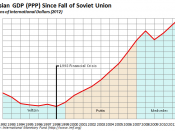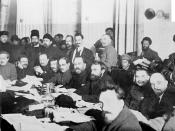The power struggles between the 'great men' of the early Bolshevik rule are well documented. From Prince Lvov to the death of Lenin in 1924, historians have captured, despite attempted erasure, most of the truth behind the events which prompted the Revolution, continued the Civil War and ended policies like War Communism. However, it is imperative to examine the social reverberations from the political changes during that era and to make a holistic judgment as to whether or not the lives of the Russian people, for whom the Revolution supposedly took place, had improved.
There are several inherent factors that should be separated from the action of the Bolsheviks. In 1917, the Bolsheviks had just undergone two revolutions, overthrown a monarchical rule of three centuries, then bypassed the Provisional Government and successfully withdrew from a world war. The agrarian country's production in food had decreased by half and the industry was only one fifth of the level from before the war.
Though many argue that governmental policies like War Communism and nationalization, the use of terror through the Cheka and propaganda, were cruel methods employed by the party for power at the sacrifice of the people, the linear context of the situation should be noted. Basic attributes of the country already made development, unification and stability difficult. The geography, backward and illiterate society, lack of modernization and industrialization, in juxtaposition to continental Europe, natural disasters and the naturally inhospitable climate, are among numerous reasons why the country, under the Bolsheviks or any other form of government, could not have transitioned immediately into a worker's paradise. So in its historical and circumstantial context, the Bolsheviks did make a significant difference in the lives of workers, women and in the field of education; three elementary pillars to any successful society.
Firstly,


